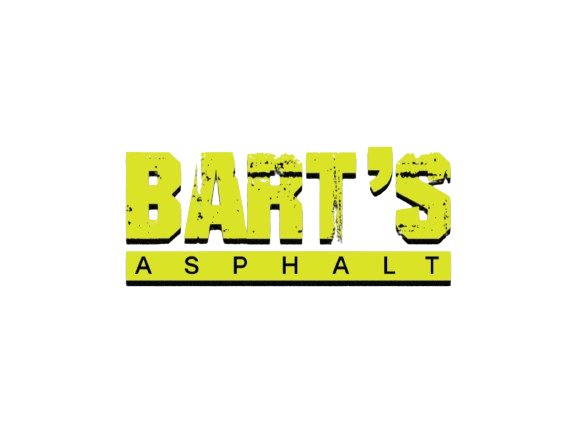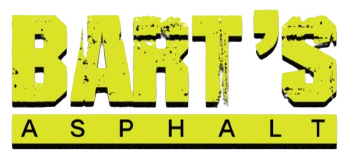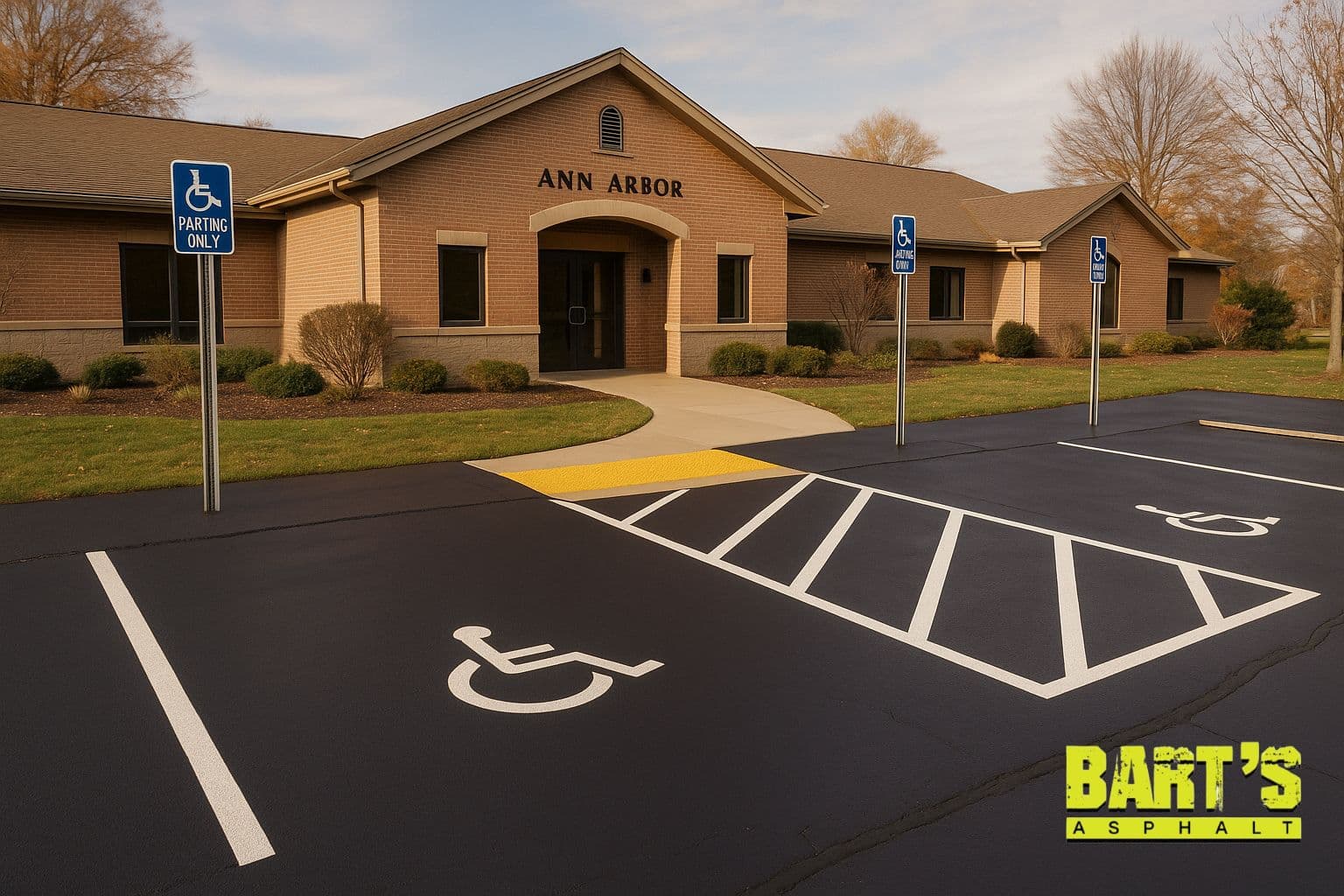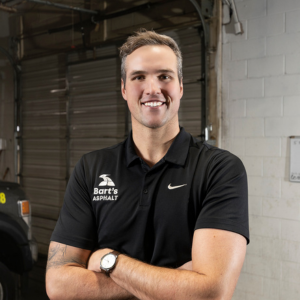Safety and appearance are priorities for religious and community centers in Ann Arbor. Well-maintained asphalt surfaces help create positive first impressions for visitors and community members, influencing how the property is perceived from the outset. Additionally, well-maintained pavement enhances property safety, curb appeal, and long-term value.
City regulations and ordinances in Ann Arbor may impact asphalt repair solutions for religious and community centers, including requirements for permits and compliance with municipal standards within city limits.
This guide covers effective asphalt repair solutions for religious and community centers in Ann Arbor to address heavy traffic and local climate challenges specific to these facilities.
Key Takeaways
Religious and community centers require tailored asphalt solutions due to unique traffic patterns and Michigan’s climate, necessitating experienced contractors familiar with local conditions.
Implementing preventive maintenance strategies, including crack sealing and sealcoating, can greatly extend the lifespan of asphalt surfaces and improve safety.
ADA compliance is important in asphalt repairs for accessibility.
Engaging local contractors with a strong reputation can facilitate effective and budget-friendly maintenance solutions.
Schedule asphalt maintenance and repairs by a specific date to ensure timely upkeep and prevent surface deterioration.
Understanding the Unique Asphalt Needs of Religious and Community Centers in Ann Arbor
Religious and community centers have unique operational requirements due to their distinct worship schedules and community activities.
These centers often face heavy foot and vehicle traffic during specific times, which can lead to accelerated wear and tear on their asphalt surfaces. Like schools, religious and community centers require regular maintenance and upgrades to ensure their infrastructure remains safe and visually appealing for all visitors.
Without regular maintenance, asphalt surfaces can fall into disrepair, increasing safety risks and repair costs. Also, the freeze-thaw cycles characteristic of Michigan’s climate pose unique challenges, as fluctuating temperatures can cause asphalt to crack and deteriorate more quickly.
Measuring Asphalt Repair Needs
For property managers, homeowner associations, and business owners in Southeast Michigan, accurately measuring asphalt repair needs is a first step in maintaining the safety and appearance of any property.
Homeowners in surrounding communities also benefit from well-maintained asphalt surfaces, which enhance neighborhood appeal and safety.
Regular assessments help identify trip hazards, cracks, and other forms of surface damage that can impact customers and employees.
Begin by conducting a thorough inspection of all asphalt areas, including parking lots, driveways, and walkways. Use both metric and imperial units to measure the length, width, and depth of cracks or damaged sections, ensuring precise data collection for repair planning.
Documenting these measurements allows property owners and managers just like you to prioritize repairs based on severity and location, helping to maintain a safe environment and a positive first impression for visitors.
Proven Preventive Maintenance Strategies for Long-Term Pavement Life
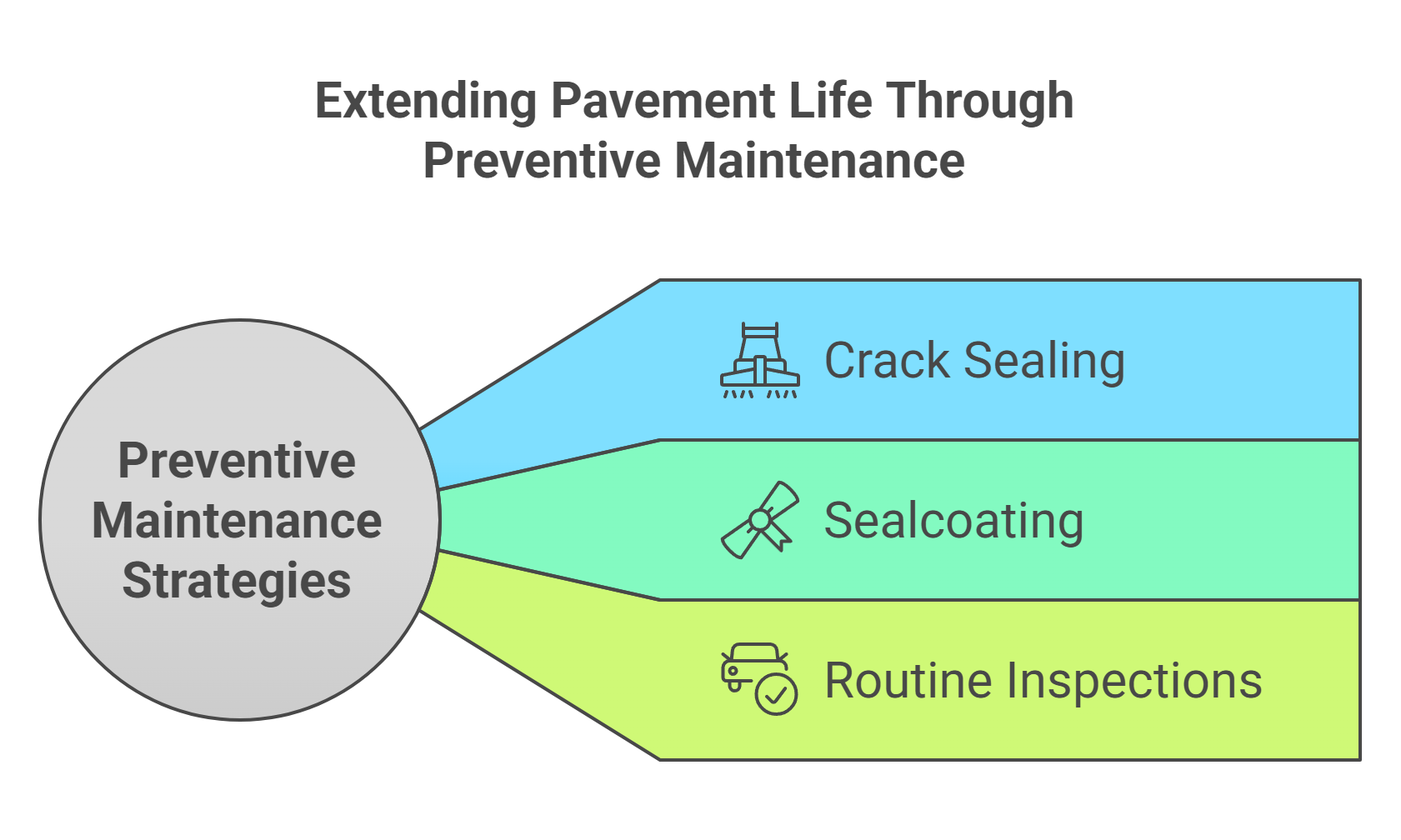
As religious buildings age, their associated asphalt surfaces also deteriorate, necessitating regular maintenance to establish congregant safety. Implementing preventive maintenance measures can help extend the lifespan of asphalt pavement by addressing minor issues before they escalate into costly repairs. Maintenance vehicles are operated in accordance with city guidelines to ensure safety and compliance during repair activities.
To address this more effectively, a comprehensive Pavement Management Plan (PMP) helps organizations prioritize maintenance based on budget limitations and urgent safety needs. They do this through:
Professional Crack Sealing Services
In Michigan, where freeze-thaw cycles are common, prompt sealing of cracks can prevent water infiltration and subsequent freeze-thaw damage.
In fact, crack sealing on well-maintained surfaces can extend pavement life by two to five years, depending on climate conditions and traffic patterns.
Protective Sealcoating Applications
A protective sealcoat acts as a barrier against harmful UV rays and moisture, effectively shielding asphalt and prolonging its durability. In some cases, other materials such as pavers or concrete may be considered for specific areas to enhance durability or meet compliance requirements.
Routine Professional Inspections
Conducting systematic inspections allows for early detection of minor issues, preventing them from escalating into major, costly repairs.
Specialized Repair Solutions Tailored for Ann Arbor’s Climate
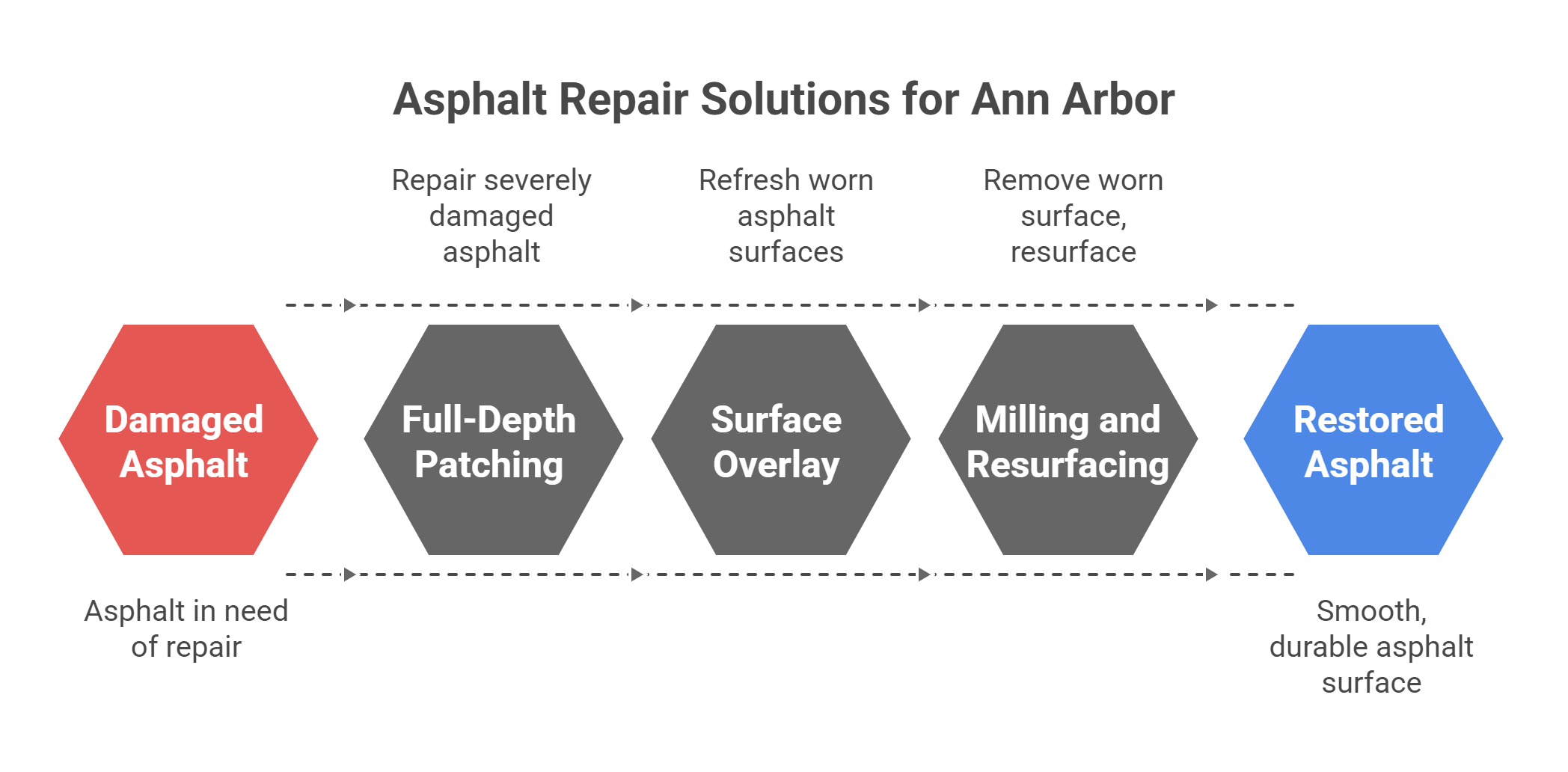
Contractors who are familiar with Ann Arbor’s specific climate conditions and soil composition are better equipped to handle local asphalt maintenance needs.
Their long-term repair solutions are built to withstand Ann Arbor’s climate and heavy use, establishing long-term durability. Each religious institution presents unique challenges that require customized solutions for maintaining its parking lots and walkways. Integrating asphalt repairs at street intersections is essential to ensure accessibility and compliance with local regulations, especially where walkways meet the street.
Understanding Michigan’s freeze-thaw cycles is important for selecting appropriate repair materials and timing, a situation that only professionals can grasp.
Full-Depth Patching for Severe Damage
Full-depth patching is a comprehensive repair method that addresses severely damaged asphalt sections to restore complete functionality. This process involves removing the entire damaged asphalt layer and replacing it with new material to ensure proper structural integrity.
Surface Overlay Applications
Surface overlays are a cost-effective solution that applies a new asphalt layer over existing pavement to refresh the appearance without full reconstruction.
Asphalt overlays can rejuvenate worn surfaces, extending their lifespan while being a cost-effective alternative to complete pavement replacement. This method is ideal for pavements with surface wear but structurally sound foundations.
Milling and Resurfacing Services
Milling is the process of removing the worn surface layer, followed by resurfacing with fresh asphalt for a smooth, durable finish. The milling process involves:
Removing the top layer of asphalt to prepare for new layers.
Strengthening pavement smoothness and integrity.
Ensuring that the new surface layer adheres properly to the existing base, providing a professional finish.
Milling and resurfacing are particularly effective for industrial and retail spaces that require durable, smooth surfaces.
Eco-Friendly Asphalt Repair Options
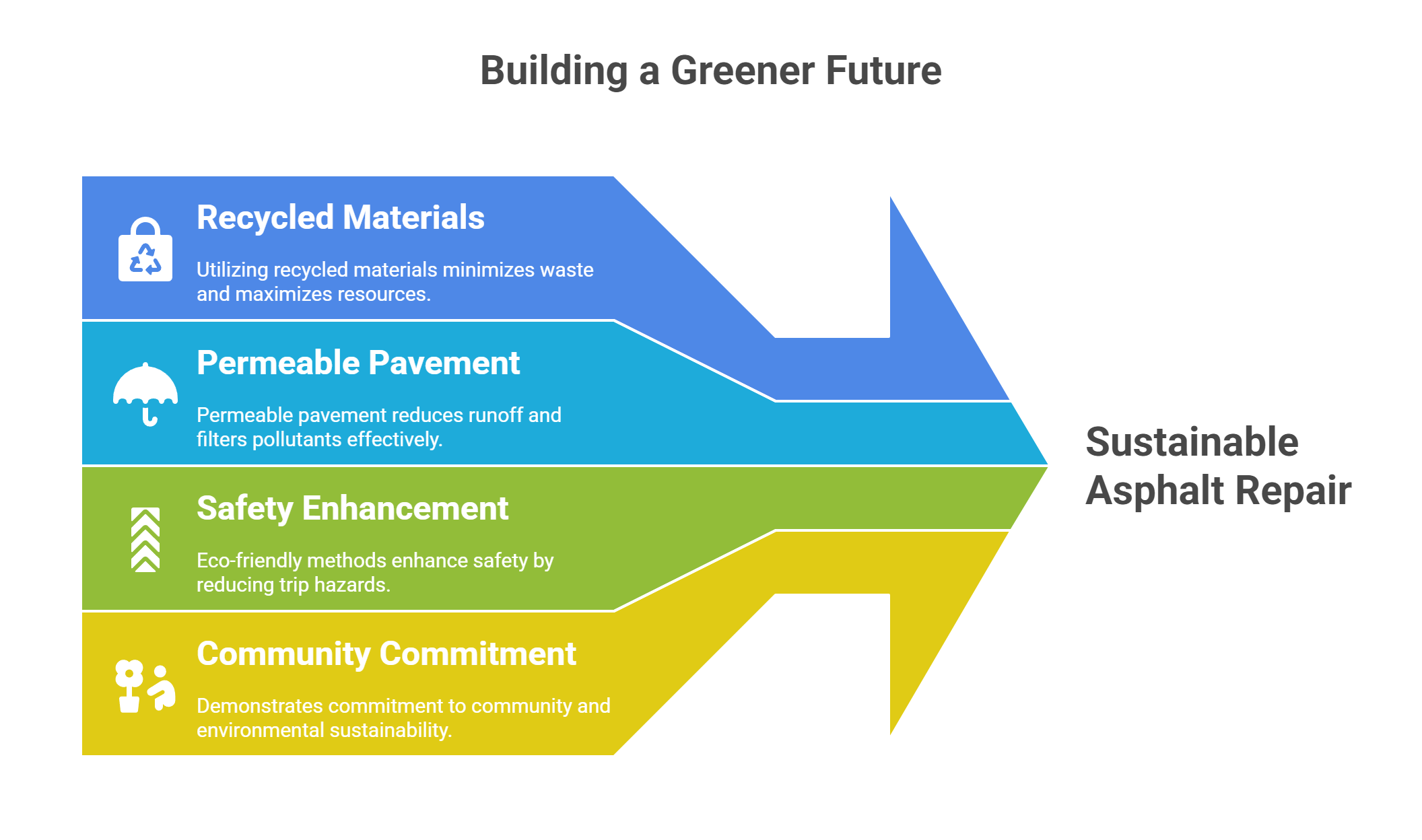
Eco-friendly asphalt repair options are gaining traction among property managers, homeowner associations, and businesses throughout Southeast Michigan.
These innovative solutions not only help reduce the environmental impact of traditional asphalt repairs but also provide long-lasting, cost-effective results for your property.
By incorporating recycled materials such as reclaimed asphalt pavement (RAP), property owners can minimize waste and make the most of existing resources.
Another sustainable choice is the use of permeable pavement systems, which allow rainwater to filter through the surface, reducing stormwater runoff and helping to filter out pollutants before they reach local waterways.
Choosing eco-friendly repair materials and methods can also enhance safety by reducing trip hazards and improving the overall quality of the pavement for residents, customers, and visitors.
These sustainable options demonstrate a commitment to the community and the environment, while still providing the durability and performance needed for busy properties.
By investing in eco-friendly asphalt repair, property managers and owners can help build a more sustainable future for Southeast Michigan—while keeping their properties safe, attractive, and cost-efficient.
Scheduling Repairs Around Worship Activities
Effective scheduling of repairs ensures that worship services and community events are not disrupted. This coordination helps to reduce interruptions and ensures that community events can proceed smoothly.
Emergency Repairs
Quick response services for emergency repairs can prevent safety hazards and ensure accessibility in community spaces. Having an emergency repair plan guarantees that critical issues are addressed promptly, minimizing potential hazards.
Budget-Friendly Solutions for Religious Facilities
Religious centers often focus financial resources on community services rather than facility maintenance, which can lead to neglected asphalt surfaces. Worship centers often experience disrepair in their parking lots due to limited budgets. Implementing preventive maintenance can substantially extend asphalt surface lifespan while adhering to strict budget limitations.
Affordable Maintenance Plans
Crack filling is considered the most economical preventative measure for asphalt, as it addresses minor issues before they escalate into major problems. DIY maintenance tasks such as crack filling for small cracks can be performed to save on costs, while larger cracks should be handled by professionals.
Cost-Effective Repair Methods
Cost-effective repair methods are essential for maintaining asphalt surfaces, particularly for budget-conscious religious and community centers. Surface overlays can be a cost-effective solution that restores asphalt surfaces without the expense of complete replacement.
Ensuring ADA Compliance in Asphalt Repairs
Specific regulations include ensuring that level changes do not exceed 1/4 inches, and pavements must have passing spaces every 200 feet if less than 60 inches wide. Sidewalks must be constructed from hard materials such as concrete or asphalt to be considered ADA-compliant.
ADA requirements apply to most commercial properties and businesses, including many types of facilities such as retail stores, restaurants, and public service providers. However, some organizations or buildings may be exempt from certain ADA standards. ADA-compliant sidewalks cannot have slopes steeper than 1:20 or 5% without being treated as ramps.
Therefore, it is important to understand that there are many types of entities, each with different compliance requirements. Failure to comply with ADA regulations can result in penalties and harm relationships with customers and the community.
Non-compliance can lead to serious financial penalties. The fines may reach up to $75,000 for the first violation and $150,000 for any further violations. Professional services such as concrete leveling also does a great job at eliminating trip hazards, integrating compliance with ADA standards.
Accessible Parking and Pathway Requirements
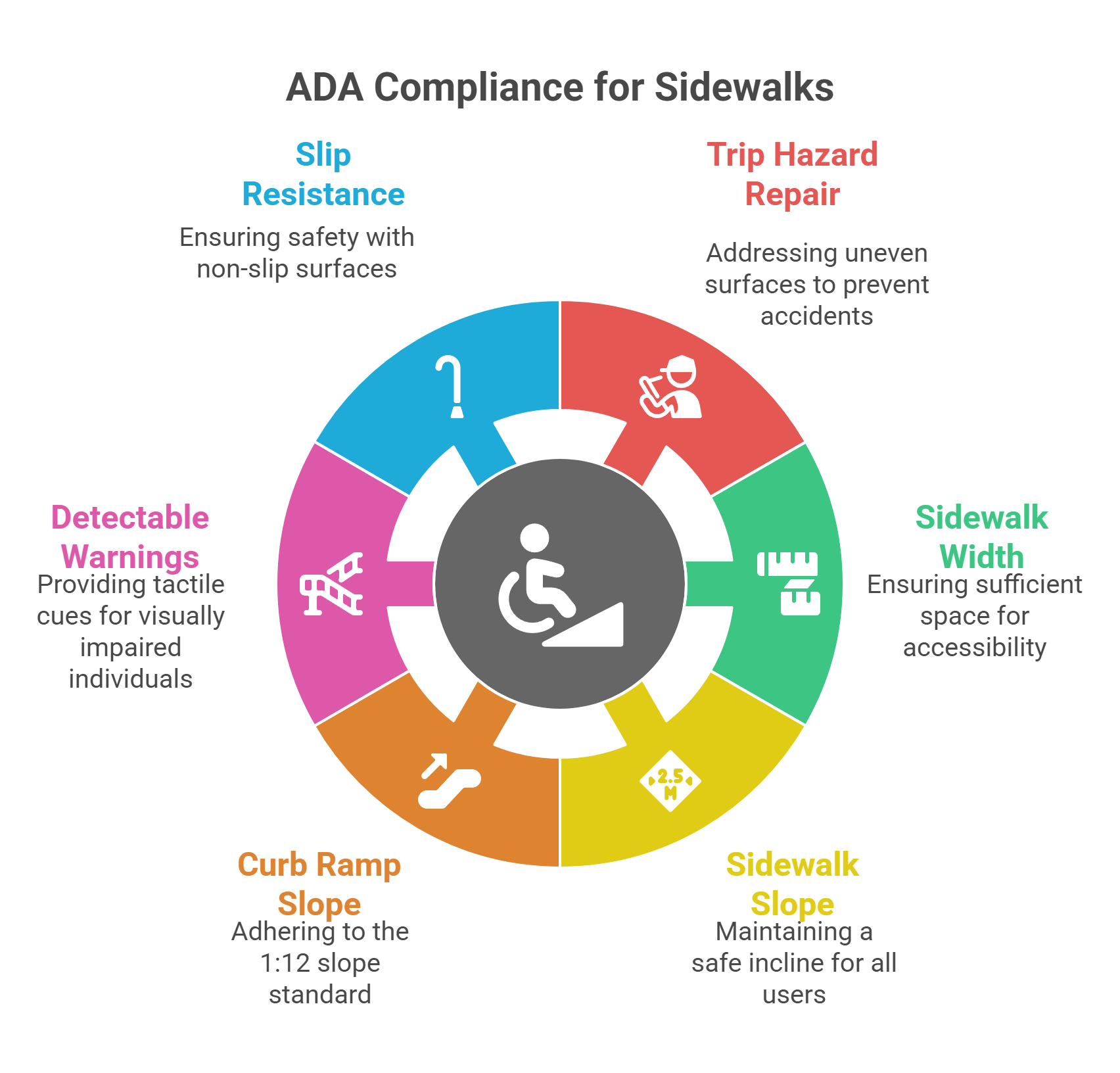
The ADA compliance requirements for sidewalks and curb ramps include:
Trip hazards such as raised or sinking concrete above ¼ inch must be repaired to meet ADA requirements.
Minimum required width for sidewalks: 36 inches
Maximum allowable slope for sidewalks: 5%
Maximum slope for curb ramps: 1:12 according to 2010 ADA Standards
Requirement for curb ramps: a detectable warning device with bumps and contrasting color to aid visually impaired individuals.
Sidewalks must be slip-resistant to ensure safety for users of canes or walking aids to meet ADA standards.
Detectable Warning Devices and Safety Features
Detectable warning devices serve as a need-to-have tool for visually impaired individuals, enabling them to navigate more safely in public spaces. These devices provide tactile and audible cues at curb ramps and crossings, to make sure that they can hear potential hazards.
Enhancing Safety and Visual Appeal
Well-maintained asphalt surfaces also enhance the safety and appeal of apartments and multi-family housing within the community. Effective line striping gets the job done by improving traffic flow and providing clear navigation forms for vehicles in these places.
Not just that, applying protective treatments to asphalt surfaces helps shield them from UV exposure, moisture, and chemical damage. And these treatments can maintain the color and integrity of the asphalt over time.
Building Strong Community Relationships Through Asphalt Repair
Investing in high-quality asphalt repair is more than just a property improvement—it’s a way for property managers, homeowner associations, and businesses in Southeast Michigan to strengthen their ties with the community.
Well-maintained pavement creates a welcoming environment, making a positive first impression on customers, residents, and visitors. It also plays a crucial role in ensuring safety, reducing the risk of accidents, and supporting the overall quality of life within the community.
By prioritizing regular maintenance and timely repairs, property owners show their commitment to keeping their properties safe, attractive, and accessible. This proactive approach not only benefits individual properties but also contributes to the broader community by enhancing the appearance and functionality of commercial and residential areas.
Partnering with a reputable asphalt repair company ensures that repairs are completed to the highest standards, further reinforcing trust and satisfaction among residents and customers. For additional information and resources on building strong community relationships through asphalt repair, property owners are encouraged to explore community development guides and maintenance best practices.
Choosing the Right Asphalt Contractor in Ann Arbor
One sure way to choosing the right contractor is to review feedback from past clients, which can provide valuable insights into the quality of prospective asphalt services that they provide.
Many online directories for asphalt contractors in Ann Arbor offer features such as auto zoom and zoom controls on their maps, along with category advanced search options. These tools allow users to filter results by current category, making it easier to efficiently find and select the most suitable contractor.
It is also important to select a contractor with an experienced team that can deliver high-quality, customized asphalt repair solutions tailored to the needs of your property.
Verification of proper licensing or insurance is also something to look out for. This can help protect your institution from liabilities.
Warranty and Guarantee: Protecting Your Investment
When it comes to asphalt repair in Southeast Michigan, a solid warranty and guarantee are essential for protecting your property investment. Leading asphalt repair companies provide comprehensive warranties that cover both materials and workmanship, ensuring that your repairs are built to last.
Depending on the type of repair and the materials used, these warranties can range from several years to over a decade, giving property owners peace of mind and confidence in the quality of the work performed.
A robust warranty means that if any issues or defects arise, the repair company will address them promptly—saving you from unexpected costs and hassle down the road. This level of protection is especially important for property owners who want to ensure the longevity and performance of their asphalt surfaces.
To learn more about available warranty and guarantee options, property owners in Southeast Michigan can request a consultation with a trusted asphalt repair provider, ensuring they are fully informed and their investment is well-protected.
Customer Service and Ongoing Support
Outstanding customer service and ongoing support are key factors in a successful asphalt repair experience for property owners in Southeast Michigan.
A reputable asphalt repair company will provide clear communication, flexible scheduling, and minimal disruption to your daily operations, ensuring that your property remains safe and accessible throughout the repair process.
Their dedicated team should be available to answer questions, address concerns, and provide guidance every step of the way.
Beyond the initial repair, ongoing support and maintenance services help property owners navigate the complexities of asphalt care, ensuring that pavement remains in top condition year after year. This proactive approach not only extends the life of your asphalt but also helps prevent future issues, keeping your property safe and visually appealing.
To ensure you receive the highest level of service and support, consider scheduling a consultation with a reputable asphalt repair team in Southeast Michigan—your property, residents, and customers will thank you.
Summary
We believe that with this guide, you now have a fair understanding of what it takes to maintain the asphalt surfaces of your religious or community centers in Ann Arbor.
For additional information on the subject of asphalt repair solutions and ADA compliance for religious and community centers, please explore our related resources.
Ready to take the next step with professional services? Barts Asphalt can take you there.
Frequently Asked Questions
Why is preventive maintenance important for asphalt surfaces in religious and community centers?
Preventive maintenance is important for asphalt surfaces in religious and community centers as it extends their lifespan and establishes safety by addressing minor issues before they develop into expensive repairs.
What are the benefits of professional crack sealing services?
Professional crack sealing services effectively prevent water infiltration, safeguarding the pavement foundation from structural damage and mitigating freeze-thaw issues.
How can religious centers schedule asphalt repairs to minimize impact on congregation activities?
To minimize impact on congregation activities, schedule asphalt repairs during off-peak hours or weekdays, and coordinate with congregation leaders to ensure minimal disruption.
What are some cost-effective repair methods for maintaining asphalt surfaces?
Utilizing surface overlays and partial-depth repairs can effectively maintain asphalt surfaces while minimizing costs compared to full-depth replacements.
Why is ADA compliance important in asphalt repairs for religious and community centers?
ADA compliance in asphalt repairs for religious and community centers is important as it ensures accessibility and safety for all individuals, supporting inclusivity and well-being within the community while also avoiding potential legal penalties.
